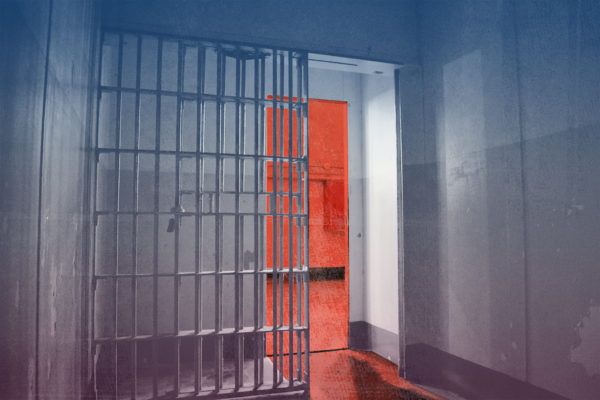Oklahoma Department of Corrections Agrees to Move ‘Qualifying’ Death Row Prisoners Out of Tomblike Unit
Some death row prisoners will be moved to another unit with access to direct sunlight, fenced-in recreation, and contact visits, department says.

All “qualifying death row inmates” will be moved out of their current housing unit and into another unit at Oklahoma State Penitentiary in McAlester within 30 days, according to a Sept. 26 letter from the Oklahoma Department of Corrections to the ACLU of Oklahoma.
As The Appeal reported Wednesday, H Unit, Oklahoma’s death row, currently houses 44 of the state’s 47 death-sentenced prisoners in permanent solitary confinement. In July, several organizations, including the ACLU and the Prison Law Office, sent a letter demanding that the department of corrections cease this practice and house those sentenced to death based on the same criteria as other prisoners.
In his letter, Scott Crow, interim director for the Oklahoma Department of Corrections, vowed to move “qualifying” prisoners out of the unit within a month, though his response does not articulate what criteria will be used to determine who can be transferred. The Oklahoma Department of Corrections could not immediately answer questions from The Appeal seeking clarification.
Crow wrote in the letter that there had been “informal discussions” of the issue within the agency for some time. “This move will significantly change their access to natural light and view of the outdoors,” he wrote. “Furthermore, recreation on A Unit has direct sunlight and outside air in a fenced rather than walled environment where conversation among inmates is unrestricted. We also plan to begin contact visitation upon their relocation consistent with A Unit visiting procedures.”
Corene Kendrick, a staff attorney with the Prison Law Office, told The Appeal via email that this is “welcome news,” but additional details are needed.
“The letter doesn’t explain what ‘qualifying’ means, so we will need to get more information about what the criteria will be,” she wrote. “All of the condemned men should have an opportunity to show that they can be safely housed in more humane conditions where they can sit in a room with other people, or go outside to breathe fresh air, feel the sun’s warmth, and see the sky.”
Since H Unit opened in 1991, Oklahoma’s nearly all death row prisoners have lived in permanent solitary confinement. As The Appeal reported, they spend at least 22 hours a day in their cells, which are smaller than most parking spaces, according to advocates. There are no windows to the outside world. The cells, one Amnesty International delegate wrote in 1994 after visiting the prison, give “the appearance of what amounts to a concrete tomb.”
Exercise, which is supposed to be one hour a day five times a week, occurs in a 20-by-20-foot concrete room with an opaque skylight, according to advocates. During visits, permitted on Fridays and weekends, prisoners and their visitors speak by phone, separated by plexiglass.
Mary, whose brother is on death row in Oklahoma, was pleased to hear about the department’s response, noting in a text to The Appeal that it shows “great progress.” To protect her brother from possible retaliation, The Appeal is not using Mary’s real name.
“My worry is they say qualifying inmates,” she texted. “I hope my brother is one of them.”
In the advocates’ July letter, they also demanded that the department reinstate congregate religious services; then Warden Randall Workman banned these services in 2009.
In the department’s response, Crow wrote, “If the inmates adjust well to the A Unit environment, we will assess their suitability for jobs and congregate religious services.”
Advocates say denying congregate religious services violates the Religious Land Use and Institutionalized Person Act. The federal statute protects prisoners’ “religious exercise.” That right can only be impeded, according to the statute, if the state can show there is a “compelling government interest.” In Workman’s interoffice memo announcing the termination of “group congregation services,” no justification was provided.
“We hope to engage in further discussion with state officials about the criteria they plan to use for housing the men in A Unit, and the issue of the religious services, with the goal that we can avoid litigation,” wrote Kendrick in her email to The Appeal. “The most problematic part of the response is that ODC [Oklahoma Department of Corrections] still considers congregate religious services to be a ‘privilege’ and not the fundamental right that it is.”
